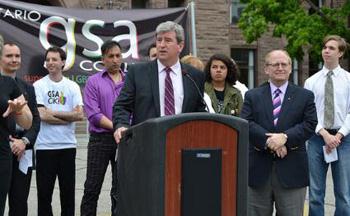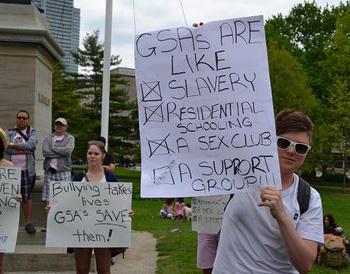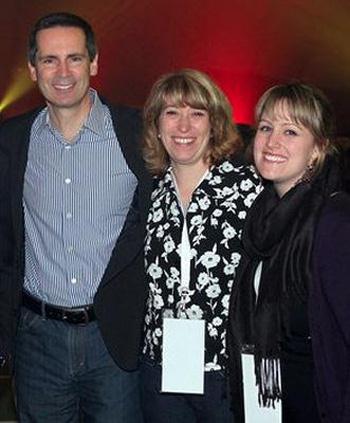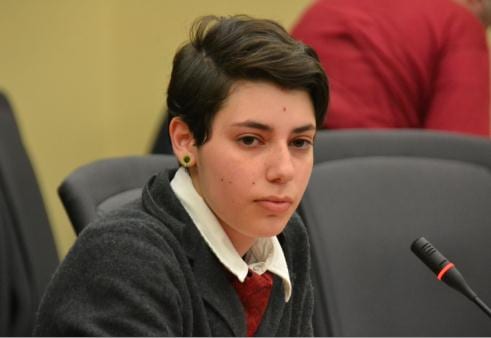
MPP Glen Murray speaks at the GSA rally May 12 at Queen's Park. Credit: Andrea Houston

A sign at the pro-GSA rally. Credit: Andrea Houston

From left: Premier Dalton McGuinty, Education Minister Laurel Broten and Paris Meilleur, press secretary for the minister. Credit: Facebook

Student Matthew Bawcutt, who is president of his GSA at Birchmount Park Collegiate, spoke at the rally. Credit: Andrea Houston
UPDATE – May 15: Education Minister Laurel Broten said in question period May 15 that she “expects” Catholic schools to comply with anti-bullying legislation, but she offered no guarantees or assurances that they will.
The statement was made following a question by NDP MPP Peter Tabuns, who asked for clarity about whether students have the right to name support clubs “gay-straight alliances (GSA)” or if school administration can overrule that choice.
“These organizations have many names, but let’s be very clear about one thing: the supports will be in place,” Broten said. “The students put up their hands — if Bill 13 is passed, those supports will be in place for our students right across this province.”
The standing committee for social policy will reconvene May 15 to hear deputations on the Liberals’ Accepting Schools Act (Bill 13) and the Progressive Conservatives’ Bill 14, which will be merged before third reading.
Activists have warned that Bill 13 – at least in its current state – will not be enough to stop Catholic schools from denying students GSAs or groups with any other “queer-sounding” name.
Broten did not elaborate on how the government plans to enforce the law once it is implemented.
Casey Oraa, vice-chair of Queer Ontario (QO), says he is concerned the government is going to allow students to fight this battle in the courts. QO submitted recommendations to the committee to make the language surrounding GSAs explicitly clear.
“We are looking for clear language,” Oraa told Xtra. “What the government is proposing is far too vague. It needs to be clear and concise language that states youth can name the group whatever they want.”
Liberal MPP Glen Murray, who has taken to Twitter to debate the issue with activists, tweeted, “The GSA Coalition has a strategy. Let’s support it.”
Doug Elliott, lawyer for the Ontario GSA Coalition, told Xtra that the language around GSAs will not be changed because the government is worried it risks a court challenge.
“The government has been told that this is as far as you can go without risking the Catholic school boards bringing their own lawsuits against the government of Ontario, and the government of Ontario being put in a difficult position where they may not be able to defend the rights of Catholic school boards,” Elliott told Xtra May 13.
Elliott says that after the legislation is passed, he fully expects the issue to end up in the courts if Catholic schools continue to ban GSAs.
On May 15, Murray tweeted, “[The legislation] will likely end up in the courts. The laws are written to survive court challenges and uphold a student’s right to name their group.”
During committee hearings on May 14 groups spoke for and against Bill 13. Student activists Leanne Iskander and Christopher Mckerracher, who have repeatedly been denied a GSA at St Joseph Catholic Secondary School in Mississauga, stressed the importance of giving students the right to choose the name.
“We are still pushing to call our group a gay-straight alliance,” Iskander told the committee. “That’s important to not only signify what the group is, but also that our school is accepting of queer students.”
In the Bill 13 clause discussing GSAs, Iskander wants “as determined by students” added to the legislation.
After deputations wrapped up, committee member Liberal MPP Kevin Flynn said the committee should listen to the students, but he did not offer any assurances that the language will change.
“I’d take what I can get now,” he told Xtra. “Bill 13 would be a huge step forward for students. Is it everything everybody wants? I don’t think so. I think it will make the vast majority of people feel it is fair. It’s not everything I wanted, but it’s more than was there before.”
Hundreds rally to support Ontario GSAs and Bill 13; Activists warn Bill 13 won’t stop Catholic schools from forbidding GSAs
More than 200 students and supporters rallied at Queen’s Park on May 12 in support of school-sanctioned gay-straight alliances (GSAs) in Ontario Catholic schools.
The rally was organized by the Ontario GSA Coalition, which was formed to build support for the McGuinty government’s Accepting Schools Act, Bill 13. Bill 13 would require all Ontario schools to establish welcoming environments and provide supports, such as GSAs, for queer students. The legislation is before the standing committee for social policy, as is Progressive Conservative Bill 14, an anti-bullying bill that neither mentions queer students nor mandates that Catholic school administrators allow GSAs in their schools. The two bills are scheduled to be merged into one Bill 13 before the end of the month.
But advocates are once again sounding the alarm that Bill 13 – at least in its current iteration – does not go far enough, and may not stop Catholic schools from forbidding their students from launching GSAs, or any clubs or groups with other direct references to queer people in their titles.
Queer Ontario vice-chair Casey Oraa says the language in Bill 13 is unclear. “Every board shall support pupils who want to establish and lead activities or organizations that promote the awareness and understanding of, and respect for, people of all sexual orientations and gender identities, including organizations with the name gay-straight alliance or another name,” reads the bill in part. Oraa says it needs to be clear that students – not school administrators – have the final decision on what to call their groups.
On May 12, Paris Meilleur, press secretary for Education Minister Laurel Broten, told Edward Keenan of The Grid that, under the provisions of Bill 13, Catholic school administrators will be able to forbid the use of the term “gay-straight alliance” and insist on some other name, contradicting what GSA Coalition lawyer Douglas Elliott and Broten have assured in the past.
Mississauga Catholic students Leanne Iskander, Christopher Mckerracher and Peterborough Catholic student Trevor James warned legislators in March that the language in Bill 13 left a loophole for Catholic school administrators. But Elliott dismisses Meilleur’s comment. “I think Paris is wrong. I’d be very surprised if she was authorized to make that statement by the minister.”
Elliott says that the government has been intentionally ambiguous in the language but that the clause weighs heavily in favour of students. The bill, he says, merely confirms existing rights. “My interpretation is that it’s up to the students to choose the name because that’s consistent with their Charter rights . . . Students right now have a constitutional right to form gay-straight alliances and choose whatever name suits them.”
“We don’t need the statute to give people the right to choose the name,” adds Elliott. “They already have that right.” Still, Elliott says he probably would have been more aggressive with the language if he had authored the legislation.
The real reason for the vagueness in current language, speculates Elliott, is that the government is frightened the Catholic trustees will launch a legal challenge against the province.
“The government has been told that this is as far as you can go without risking the Catholic school boards bringing their own lawsuits against the government of Ontario, and the government of Ontario being put in a difficult position where they may not be able to defend the rights of Catholic school boards,” he says.
Elliott says the trustees could argue that GSAs are an infringement of their religious rights under Section 93.1 of the Constitution Act of 1867.
“In the past, the government has found themselves on the losing end of fights with Catholic trustees, and so they’re being cautious here,” he says. “Frankly, I think they’re being too cautious. From my perspective, I certainly wish the law was strengthened in favour of students, but I’m also a realist. And I think realistically the Liberals have gone as far as they’re willing and able to do.”
When contacted by Xtra May 13, Meilleur sent a vague statement and did not respond to follow-up questions:
“Supporting groups like gay-straight alliances, Rainbow clubs and others, would not be optional under Bill 13 – the support must be there. If passed, every school in every board – English, French, Catholic, public – would need to be compliant with this expectation set out in the Accepting Schools Act. And we’re confident every school will.”
Oraa says he does not feel as confident. Because Catholic school boards have such a long history of banning GSAs (examples here, here, here, here and here), he says he has no reason to trust that administrators will willingly comply with the legislation, leaving it to students to step up and take on their school boards in the courts.
“What needs to happen is for the government to enforce its own policy,” says Oraa. He points to Policy/Program Memorandum 145, a clause within the equity and inclusive education policy that refers directly to GSAs but that is ignored by Catholic school adminstrators. The ministry never enforced it.
On May 14 and 15, committee hearings for Bill 13 are scheduled to continue at Queen’s Park. Last week, religious groups and parents argued strongly against GSAs, calling them sex clubs that promote a radical sex education agenda. Others called Bill 13 a form of slavery and a new residential schools policy.
Representatives of Queer Ontario are scheduled to present on May 14 and have submitted recommendations to tighten the language of Bill 13 by adding, “as determined by students” at the end of the clause.
Oraa says the McGuinty government has an opportunity to write a strong, clear law that protects students.
Student Matthew Bawcutt, president of the GSA at Birchmount Park Collegiate in Scarborough, says generic names will make GSAs invisible. “When you hear GSA, there’s meaning behind it, there’s power behind it,” he says.
Ontario Catholic School Trustees’ Association (OCSTA) president Nancy Kirby remains adamant: the GSA language in the legislation must remain vague.
In March, Kirby told Xtra that the words “or another name” meant that Catholic boards can overrule students and force them to rename the groups, even if they specifically request GSAs. “We can have other names,” Kirby said pointedly. “We will ask that those words remain in the act. We are talking about minors. We teach chastity. I don’t think [Catholic schools] need GSAs.”
On May 13, Kirby said her position has not changed.
“We’re hoping that things go the way we would like them to do, [which is] keeping the wording exactly as it is right now, GSA or another name,” she says firmly.
At the rally, lawyer Noa Mendelsohn Aviv, director of the equality program at the Canadian Civil Liberties Association (CCLA), says the government is just “treading water” if it refuses to strengthen the language in the bill.
“At the CCLA, we plan to submit our recommendations to tell the government it doesn’t need ‘or another name,’” she says. “The most plausible [legal] reading of that section is that students are allowed to form a GSA, but I can see how some people would read that different and prohibit students from calling the groups gay-straight alliances. So, unfortunately, there’s a lot of reasons to be concerned.”
Elliott says leaving it for the courts to decide is the natural fate for this issue. He says politicians will always be cautious. Rights are always won in the courts.
“From my perspective, even though I may find it a little frustrating that the Liberals don’t have more courage in these circumstances, I can live with this because I believe the clause will be interpreted in a way that favours our community,” he says.
“It will end up in the courts regardless. It’s a question of whether it will be students versus Catholic boards or Catholic boards versus government of Ontario, with students caught in the crossfire.”
Still, Oraa says it’s wrong to haul students through the courts if it can be avoided.
“If they don’t give students the right to name their groups, we are in the exact same situation as before,” he says. “Will anything actually change? This position is pushing marginalized youth further to the margins.”
Elliott says he agrees, but stresses Catholic schools are gambling their funding on this issue. “When people in Ontario wake up and see the bishops control their educational tax dollars, they will start to express anger and hostility. They aren’t going to put up with that. Yes, [Catholic schools] have constitutional rights, but our Constitution can be amended, and it has been, in Quebec and Newfoundland, they got rid of denominational schools.
“[GSAs] are so fundamentally important to Catholic schools that they’ll risk losing Catholic schools to defend this position?”
For those interested in reading Bill 13, the legislation can be found here. Bill 14 can be found here.
Queer Ontario (QO) Bill 13 Amendments Bill 13/14 committee schedule – May 14 Bill 13 committee schedule – May 15.
Queer Ontario (QO) Bill 13 Amendments Bill 13/14 committee schedule – May 14 Bill 13 committee schedule – May 15

 Why you can trust Xtra
Why you can trust Xtra


